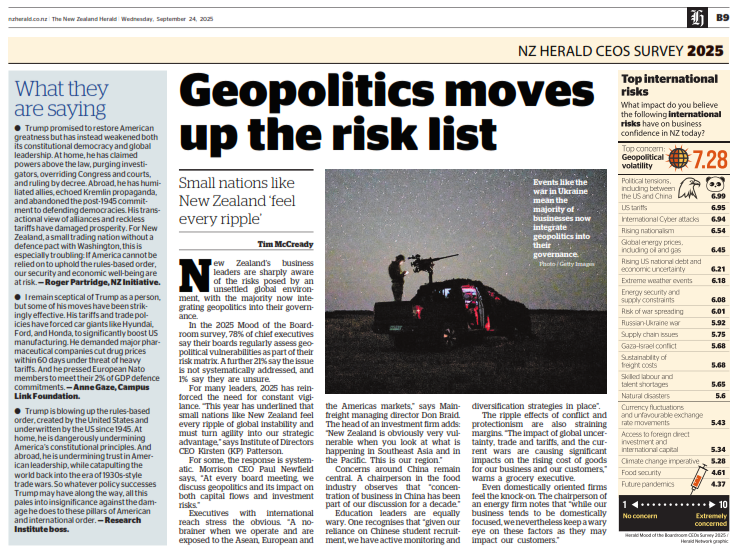Mood of the Boardroom: Geopolitics moves up the risk list (NZ Herald)
New Zealand’s business leaders are sharply aware of the risks posed by an unsettled global environment, with the majority now integrating geopolitics into their governance.
In the 2025 Mood of the Boardroom survey, 78% of chief executives say their boards regularly assess geopolitical vulnerabilities as part of their risk matrix. A further 21% say the issue is not systematically addressed, and 1% say they are unsure.
For many leaders, 2025 has reinforced the need for constant vigilance. “This year has underlined that small nations like New Zealand feel every ripple of global instability and must turn agility into our strategic advantage,” says Institute of Directors CEO Kirsten (KP) Patterson.
For some, the response is systematic. Morrison CEO Paul Newfield says, “At every board meeting, we discuss geopolitics and its impact on both capital flows and investment risks.”
Executives with international reach stress the obvious. “A no-brainer when we operate and are exposed to the Asean, European and the Americas markets,” says Mainfreight managing director Don Braid. The head of an investment firm adds: “New Zealand is obviously very vulnerable when you look at what is happening in Southeast Asia and in the Pacific. This is our region.”
Concerns around China remain central. A chairperson in the food industry observes that “concentration of business in China has been part of our discussion for a decade.”
Education leaders are equally wary. One recognises that “given our reliance on Chinese student recruitment, we have active monitoring and diversification strategies in place”.
The ripple effects of conflict and protectionism are also straining margins. “The impact of global uncertainty, trade and tariffs, and the current wars are causing significant impacts on the rising cost of goods for our business and our customers,” warns a grocery executive.
Even domestically oriented firms feel the knock-on. The chairperson of an energy firm notes that “while our business tends to be domestically focused, we nevertheless keep a wary eye on these factors as they may impact our customers.”
